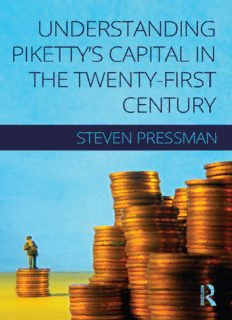
Understanding Piketty’s Capital in the Twenty-First Century PDF
Preview Understanding Piketty’s Capital in the Twenty-First Century
Understanding Piketty’s Capital in the Twenty-First Century Thomas Piketty’s Capital in the Twenty-First Century reached the top of most best seller lists shortly after it was released. Nonetheless, few people actually read the book. Yet reviewers have agreed that the book is important because it touches on one of the major problems facing the US economy, the UK economy, and many developed nations: rising income and wealth inequality. It also provides an explanation of the problem and a policy solution: a global wealth tax. This book is intended to do three things. First, it provides a summary of the argument of Piketty’s work, which many people have bought and few people have read. Second, it fills in some of the gaps in the book, by providing readers with the background that is needed to understand the volume and the argument. This background information discusses economic data sources, measures of inequality, and why income inequality is such an important issue today. Finally, the work provides a defense of Piketty’s analysis and at times some criticism of his work. Pressman explains why the problem of rising inequality is important, where Piketty’s data comes from, and the strengths and weaknesses of that data. It defends Piketty’s inequality, r>g, as the reason inequality has risen over the past several decades in many developed nations. Using Piketty’s own data, this book argues that rising inequality is not just a characteristic of capitalism, but results from different growth rates for income and wealth, which can occur under any type of economic system. Understanding Piketty’s Capital in the Twenty-First Century is the ideal introduction to one of the most important books of recent years for anyone interested in Piketty’s work and the inevitability of inequality. Steven Pressman is Professor of Economics at Colorado State University in Fort Collins, Colorado, and Professor Emeritus of Economics and Finance at Monmouth University in West Long Branch, NJ. He also serves as North American Editor of the Review of Political Economy, Book Review Editor of the Eastern Economic Journal, and Treasurer of the Eastern Economic Association. Pressman has published more than 150 articles in refereed journals and as book chapters, and has authored or edited 17 books, including A New Guide to Post Keynesian Economics (2001), Alternative Theories of the State (2006), and 50 Major Economists, 3rd ed. (2013), which has been translated into five different languages. He is also a frequent contributor to local newspapers, and appears frequently on local and national TV. “This is the most important critique of the most important book in economics in recent years. Pressman breaks down Piketty in a manner that will be valuable to both scholars and students alike.” Robert S. Rycroft, Professor of Economics, University of Mary Washington, USA “Piketty’s Capital in the Twenty-First Century is one of the most widely discussed books so far in this century, but what is badly needed is a good-humored, readable introduction, which is provided by Steven Pressman’s Understanding Piketty’s Capital in the Twenty-First Century. Like Piketty, Pressman is a chronicler of inequality.” E. Ray Canterbery, Professor Emeritus of Economics, Florida State University, USA Understanding Piketty’s Capital in the Twenty-First Century Steven Pressman First published 2016 by Routledge 2 Park Square, Milton Park, Abingdon, Oxon OX14 4RN and by Routledge 711 Third Avenue, New York, NY 10017 Routledge is an imprint of the Taylor & Francis Group, an informa business © 2016 Steven Pressman The right of Steven Pressman to be identified as author of this work has been asserted by him in accordance with Sections 77 and 78 of the Copyright, Designs and Patent Act 1988. All rights reserved. No part of this book may be reprinted or reproduced or utilised in any form or by any electronic, mechanical, or other means, now known or hereafter invented, including photocopying and recording, or in any information storage or retrieval system, without permission in writing from the publishers. Trademark notice: Product or corporate names may be trademarks or registered trademarks, and are used only for identification and explanation without intent to infringe. Disclaimer: Every effort has been made to identify the owners of copyrights and to obtain permission to reproduce copyrighted material. British Library Cataloguing in Publication Data A catalogue record for this book is available from the British Library Library of Congress Cataloging in Publication Data Pressman, Steven, 1952– Understanding Piketty’s capital in the twenty-first century / Steven Pressman. pages cm 1. Piketty, Thomas, 1971– Capital au XXIe siècle. English. 2. Capitalism. 3. Income distribution. I. Title. HB501.P6923 2015 332’.041—dc23 2015013488 ISBN: 978-1-138-93974-5 (hbk) ISBN: 978-1-138-93975-2 (pbk) ISBN: 978-1-315-67472-8 (ebk) Typeset in Bembo by Keystroke, Station Road, Codsall, Wolverhampton For the kids, Rachel, Sarah, and Thaddeus and their spouses, Richard, Marshall, and Hiroko Contents List of figures List of tables Preface 1 Hello Piketty 2 The fear of all sums: measuring income distribution 3 No tomfoolery: the costs of inequality 4 A big Piketty-ture (Part One: Introduction and chapters 1–2) 5 In a pretty Pikkel-ty (Part Two: chapters 3–6) 6 Pikketing income inequality (Part Three: chapters 7–12) 7 A taxing wealth of policy options (Part Four: chapters 13–16 and the Conclusion) 8 Giles goat boy? 9 Pikketing up the pieces Index
Description: